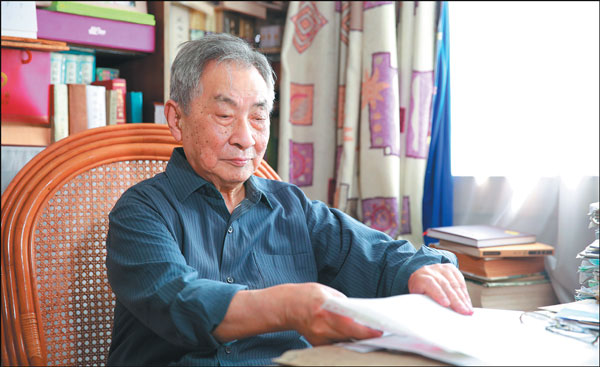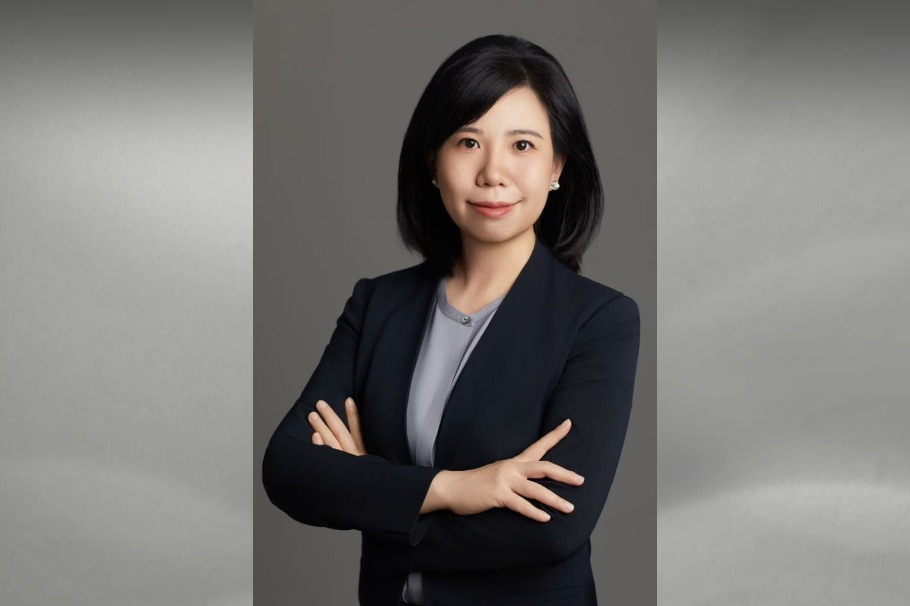Prolific animation producer's light has dimmed

After losing its way, an industry looks to get back on track
In his apartment in downtown Shanghai, the animated-film director Qian Yunda carefully takes out a folder filled with thousands of drafts of scripts and plans of sets for the 1983 animated movie Secrets of the Heavenly Book.
Tens of millions of Chinese have become well acquainted with many of the film's long cast of characters, but Qian begins reeling off behind-the-scenes tales about them that few would know.
When Qian is in full flight telling these stories, there is no stopping him. In fact, he takes you on a journey through time in which you are given a fleeting insight into the years in which the Chinese animation industry took off and thrived.
| Qian Yunda, 88, is one of the earliest Chinese animators, who worked for Shanghai Animation Film Studio Co Ltd for 30 years. Provided to China Daily |
Qian, 88, was one of the earliest Chinese animators to receive government sponsorship to study overseas and has devoted his life to the homegrown animation industry.
For about 30 years, he worked for Shanghai Animation Film Studio Co, the longest-running and largest studio of its kind in the country.
The studio, which this year has been celebrating the 60th anniversary of its founding, has been a prolific contributor to China's animated-movie industry, turning out 500 movies and TV series with a total running time of 40,000 minutes, and has won more than 200 awards in China and elsewhere.
Among those works have been highly acclaimed classics in which traditional Chinese art forms such as ink and wash painting, puppetry and paper-cutting have been used, and that has made the studio a beacon that has drawn worldwide attention to the Chinese animation industry.
As it has done that, Qian has been tightly bonded to its ups and downs like no other person.
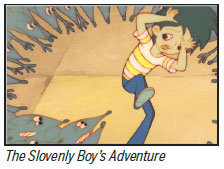
Qian, born in Jiangsu province in 1929, studied fine arts at the Central South Academy of Arts in Wuhan, Hubei province, from which he graduated in 1950.
In 1954, he was recommended by the celebrated painter Wu Zuoren to study animation in what was then Czechoslovakia, the only such student in China that year.
Czechoslovakia had classics that influenced a generation of Chinese, such as the animated TV series The Little Mole and the live-action movie The Good Soldier Schweik.
"I knew very little about animation before going to Czechoslovakia," Qian says.
Much to his surprise, by and large Czechs preferred the animated film The Good Soldier Schweik to its live-action version, he says.
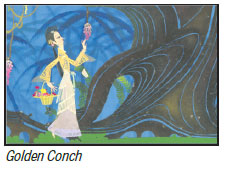
Seeing some of the most popular animated productions, many relating to war, Qian began to be fascinated by animated works, with which he felt it was easier to tell serious stories in an ultrarealistic, upbeat way.
"The magic of animation is that it can be audience-friendly and handle serious subjects in an appealing way," Qian says.
After he returned to China in 1959, he worked for the Shanghai studio for about 30 years, during which time he directed about 10 animated short films, features and TV series.
Qian says quality works need to be "unique, funny and beautifully crafted" - a slogan the Shanghai studio has worn with pride since the 1960s - and Qian has applied that rule to most of his works.
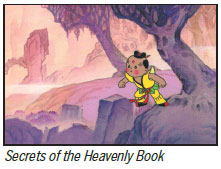
Other critically acclaimed animated movies of his include Caoyuan Yingxiong Xiaojiemei (Hero Sisters on the Prairie, 1965), based on a true story of two children who were heroes, and Nyu Wa Patches up the Sky, inspired by a Chinese myth about the origin of humans.
Secrets of the Heavenly Book, an 89-minute feature about three fox spirits stealing the titular book, is one of his best-known directorial works.
The movie was inspired by the BBC, which co-produced it with the Shanghai studio in the early 1980s. But the original tale, written by a foreign scriptwriter, disappointed the Chinese side.
"There were too many characters from a wide range of mythologies that were ultimately irrelevant," Qian says. "In addition, the plotline was very confused, with too many twists and turns for Chinese audiences."
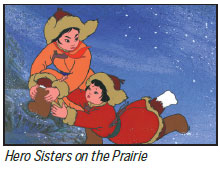
The Shanghai studio suggested that Chinese artists rewrite the tale, based on the Ming Dynasty (1368-1644) fantasy Pingyao Zhuan (Legends of Conquering Monsters).
The BBC agreed but later quit the project over financial concerns.
Having already taken advantage of a one-third of total funding, the Shanghai studio decided to fully finance the movie and assigned Qian and Wang Shuchen, another veteran animator, to co-direct the feature.
Looking for inspiration, Qian and the crew went to Chengde, Hebei province, where China's largest surviving royal garden and some Qing Dynasty (1644-1911) royal temples are located. They stayed there for more than two months, interviewing monks and sketching ancient complexes.
Thanks to its blend of Chinese culture, impressive characters and light moments, Secrets of the Heavenly Book has been hugely popular since it premiered in 1983.

It has been rebroadcast many times, and on China's popular film reviewing site Douban.com, it has a rating of 9 out of 10.
But the fortunes of Shanghai Animation Film Studio, most of whose productions were box office hits until the 1990s, began to wane as China began to rapidly change about 25 years ago.
Li Baochuan, an animation history expert at Hangzhou Normal University, says that the studio's activities have slowed as it has faced a lack of direction and a shortage of talent. This is mainly because, since reform and opening-up policies were introduced in the 1970s, Chinese mainland enterprises have been radically overhauled, having to at least partially make ends meet independent of State support.
"In the early days, the studio's bosses and animators were all top talent," Li says.
However, many great animators left in the late 1980s, lured by much more attractive financial rewards offered by privately owned animation companies in Hong Kong or Taiwan with offices in Shenzhen.
"In Shanghai, most animators were earning about 300 yuan ($45; 38 euros; £35) a month, whereas in Shenzhen they were earning 10 times that. In fact, the best of them could earn 10,000 yuan a month."
However, the careers of those who took the well-paid jobs were hampered because most were employed to do lower-end tasks.
"Western animators were brought in to design the roles and sets, which are the most creative, significant part of an animated production," Li says.
"The Chinese animators were hired to draw the content following Western concepts. Such work is highly labor-and time-intensive, but it does little to improve your creativity."
Speaking of the future of the Chinese animation industry, Qian says he believes emerging young talent and a focus on originality may bring a revival.
Su Da, one of the studio's fastest-rising young directors, exemplifies his hope. Her latest animated feature, Dear Tutu, has become popular among family audiences since it opened across the country on July 28. The movie is a tribute to the 60th anniversary of Shanghai Animation Film Studio.
The 90-minute movie tells of a naughty boy who wins a cooking competition and is based on a popular 130-episode animated TV series that has aired since 2004.
Su has spent five years polishing the stories, and says she has been inspired by her son and supported by her father, Su Taixi, a Nanjing artist who designed some of the 200-odd characters, she says.
Su Da, who has worked in the Shanghai studio since the mid-1990s, says she hopes to continue the studio's distinctive tradition, highlighting Chinese elements in the movie.
"Tutu's tale reflects the everyday lives of Chinese families and expresses Chinese emotions. With some of the designs inspired from traditional art forms such as paper-cut and shadow puppet, we hope the movie has a unique aesthetic style."
The biggest challenge for the Chinese animated industry is a lack of "highly competent, hardworking people and a good environment for creation", she says.
xufan@chinadaily.com.cn
(China Daily Africa Weekly 09/01/2017 page18)
Today's Top News
- China warns about Japan's intended military buildup
- China urges EU to halt anti-subsidy probes
- Experts: Lai not freedom fighter, but a pawn of the West
- Hainan evolves as gateway to global markets
- Opening up a new bridge between China and world
- Tour gives China-Arab strategic trust a boost
















